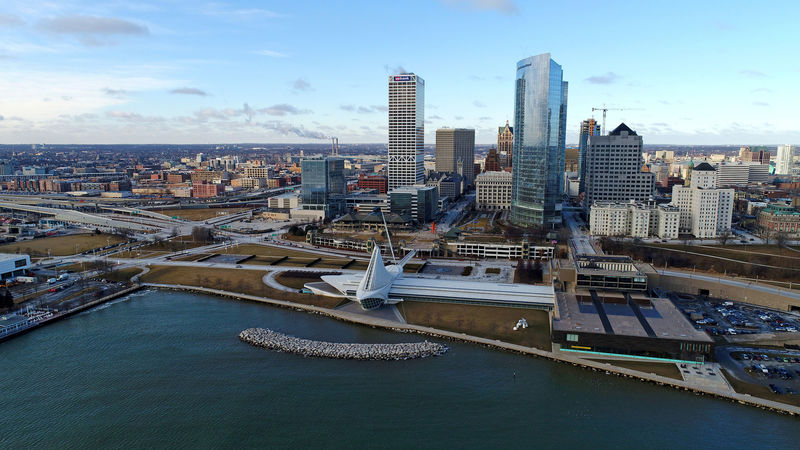By Brendan O'Brien
MILWAUKEE (Reuters) - The Democrats on Monday chose Milwaukee, Wisconsin, to host the national convention where they will formally crown the party's nominee for U.S. president in 2020, four years after Hillary Clinton narrowly lost the once reliably blue state to Republican Donald Trump.
Clinton, who did not campaign in Wisconsin during the 2016 general election campaign, also fell short in two other traditionally "blue wall" states - Michigan and Pennsylvania - by narrow margins, helping give Trump his path to victory in one of the greatest upsets in modern American politics.
The 2020 Democratic National Convention will be held July 13-16 at the Fiserv (NASDAQ:FISV) Forum arena in downtown Milwaukee, marking the first time a Midwestern city other than Chicago has hosted the event in more than a century, party officials said.
Miami and Houston were also considered as candidates for the convention. But the choice of Milwaukee, the largest city and economic heart of Wisconsin, reflected Democrats' determination to reclaim the mantle as the party of the working class in America's rustbelt.
"We will show in 490 days that the Midwest is the opportunity belt," Democratic National Committee Chair Tom Perez told a news conference at the Fiserv Forum, where the Milwaukee Bucks of the National Basketball Association play.
"We're ready to host this convention, and we are ready to make sure that all of America knows how much we care about the working people in our community," Mayor Tom Barrett said.
The announcement comes at a time of tension between moderate, establishment Democrats, whose success in the 2018 November midterm races enabled the party to regain control of the U.S. House of Representatives, and more liberal Democrats. This progressive wing is dominated by younger figures who see a chance to swing the party, and nation as a whole, to the left.
Governor Tony Evers, who defeated two-term Republican Scott Walker in the 2018 race, seemed eager to appeal to both wings of the party, pointing to Wisconsin as "a place where we value diversity, inclusivity and where we value young people."
While modern national political conventions serve largely as coronations of their parties' respective nominees - who have clinched the requisite delegate votes in advance during the primaries - the events play a key role in showcasing a party's message and highlighting up-and-coming political personalities.
CROWDED FIELD
More than a dozen Democrats have announced that they are seeking the nomination in the state-by-state contests that kick off in February 2020 with Iowa's caucuses followed by the New Hampshire primary. The unusually crowded and diverse field includes five women serving in the U.S. Senate and the party's first openly gay candidate.
Bernie Sanders, a democratic socialist and U.S. senator from Vermont who rose to national prominence when he ran in 2016, and Joe Biden, a former U.S. senator and vice president who has not formally declared but is expected to run, have emerged as front-runners in recent opinion polls.
The Republican National Convention will be held in Charlotte, North Carolina, more than a month later, Aug. 24-27.
Democrats had carried Wisconsin in presidential elections going back to the 1980s, until Clinton narrowly lost the state.
Some Republicans ridiculed the choice: "Four years too late, Democrats go to Wisconsin," Kellyanne Conway, one of Trump's senior advisers, wrote on Twitter.

The convention is expected to generate some $200 million in economic activity and draw about 50,000 visitors to Milwaukee, known historically as a hub of beer brewing and manufacturing, including the including the headquarters of Harley-Davidson Inc (NYSE:HOG), the iconic motorcycle brand.